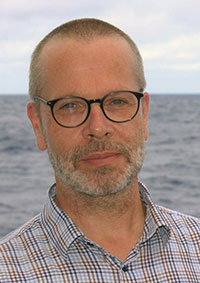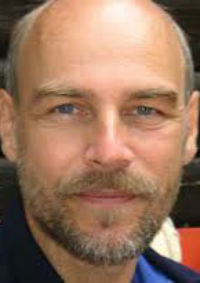Magmatic and Hydrothermal Processes
Lecturers: Wolfgang Bach, Andreas Klügel
In course work, we review concepts of phase relations and geochemistry in mantle melting and magmatic crystallization as well as water-rock interactions in hydrothermal system. We visit the IODP core repository to examine core from different drill sites in the Atlantic.
The microscopy part (1/3 of the module) is a refresher in thin section microscopy with special emphasis on textural interpretation and petrogenetic implications. Rocks from volcanic islands, the oceanic crust and the sub-oceanic mantle will be investigated.
PRE-REQUISITES:
- Basic experience in investigations of thin sections with a polarizing microscope.
- Basic knowledge of petrology and petrography of igneous rocks.
A participation is not recommended if these pre-requisites are not met!
1) Students understand phase relations and mass balance constraints of mantle melting and magmatic differentiation.
2) Students are able to use thin section microscopy to determine textures and phase assemblages and turn these observations into models of rock formation.
3) Students know how to work with rock geochemical data and interpret the results.
4) Students understand the role of ocean crust formation and alteration in System Earth.
Open-book exam with a number of comprehension questions
Hausarbeit
- Searle M, Mid-ocean ridges, Cambridge University Press
- Winter J, Introduction to Petrology, Cambridge University Press
- Best MC & Christiansen EH, Igneous petrology, Blackwell Science
- Raith MM, Raase P & Reinhardt J, Thin section microscopy, ISBN 978-3-00-037671-9 (PDF)
- Vernon RH, A practical guide to rock microstructure, Cambridge University Press
1st SWS: Primer petrology / thin section microscopy
2nd SWS: Magmatic differentiation / thin section microscopy
3rd SWS: Magmatic differentiation / thin section microscopy
4th SWS: Mantle melting, ridges / thin section microscopy
5th SWS: Mantle melting, plumes / thin section microscopy
6th SWS: Melt-rock interaction / thin section microscopy
7th SWS: Subduction zones / thin section microscopy
8th SWS: Subduction zones / thin section microscopy
9th SWS: Water-rock reactions / thin section microscopy
10th SWS: Crust-seawater exchange / thin section microscopy
11th SWS: Hydrothermal vents / thin section microscopy
12th SWS: Geochemical mass balances / thin section microscopy
13th SWS: Trace elements / thin section microscopy
14th SWS: Isotopes / thin section microscopy
Polarisations-Mikroskope
Basic Data
05-MMG-OC1-1
Study Program
Master Marine Geosciences
Module Name
Magmatic and Hydrothermal Processes
Course Type
Lecture, Exercise (L+E)
First Year of Study
6 CP
4 SWS
Winter Term
Course Language
English
Contact Person

Petrologie der Ozeankruste
Prof. Dr. Wolfgang Bach
GEO 5340R
Phone: +49 421 218 - 65400
wbach uni-bremen.de
uni-bremen.de
Petrologie der Ozeankruste
Prof. Dr. Wolfgang Bach
GEO 5340R
Phone: +49 421 218 - 65400
wbach uni-bremen.de
uni-bremen.deLecturer

Prof. Dr. Wolfgang Bach
GEO 5340
Phone: +49 421 218 - 65400
wbach uni-bremen.de
uni-bremen.de
Prof. Dr. Wolfgang Bach
GEO 5340
Phone: +49 421 218 - 65400
wbach uni-bremen.de
uni-bremen.de
PD Dr. Andreas Klügel
GEO 5360
Phone: +49 421 218 - 65402
akluegel uni-bremen.de
uni-bremen.de
PD Dr. Andreas Klügel
GEO 5360
Phone: +49 421 218 - 65402
akluegel uni-bremen.de
uni-bremen.de
